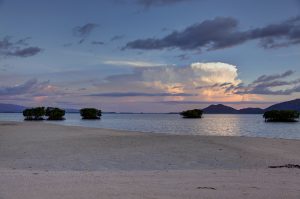Last week, Ishmael Toroama, the new president of the Autonomous Bougainville Government (ABG) in Papua New Guinea (PNG), made an intriguing visit to the southern district of Siwai. His visit was designed to continue the work of reconciliation within Bougainville as he paves the way toward independence, after the people of the region overwhelmingly voted to secede from PNG in a 2019 referendum. With this in mind, Toroama met with an unusual figure, a man named Noah Musingku, or as he prefers to be called, King David Peii II.
Musingku is the self-declared ruler of the twin kingdoms of Papaala and Me’ekamui. Yet rather than a disgruntled local chieftain who has attempted to form his own micro-state in opposition to the recognized governments in Bougainville and in PNG, Musingku is something more complex. He is the CEO of a pyramid scheme called U-Vistract, a ruse that has defrauded millions of dollars from people in PNG, the Solomon Islands, and Fiji. Musingku has used this money to establish his own personality cult, and fund a militia trained by former Fiji army officers to protect him. This places him in violation of the Bougainville Peace Agreement, which stipulates the territory should be a demilitarized zone.
U-Vistract was born out of the decade-long civil war between Bougainville and the central PNG government. In the late 1990s, the various factions of the Bougainville Revolutionary Army were seeking ways for Bougainville to gain greater financial independence from the central PNG government. Musingku promoted his scheme as a “bank for Bougainvilleans,” one that promised an extraordinary 100 percent monthly interest rate to those who invested. U-Vistract preyed on wider Melanesian hopes for a self-managed form of regional development, as well as on the deep Christian faith that exists within the region.
Driven by the prosperity theology that has come to take root within Pentecostalism, and further ignited by the unique forms of millennialism that have traction throughout the South Pacific, the scheme took off. Musingku cleverly paid out significant sums to initial investors in order to attract more. At its peak 70,000 Papua New Guineans had invested in the scheme, which expanded to the Solomon Islands and Fiji. Musingku even attracted investments from church groups in Australia before the Australian Securities and Investments Commission (ASIC) compelled him to return money to the investors. This led the PNG authorities to also start paying closer attention to his scheme and its violations of local laws.
In the early 2000s Musingku was able to evade the PNG authorities and initially fled to the Solomon Islands before returning to his home village of Tonu in southern Bougainville. Due to the sensitivities surrounding the peace process, the federal government in Port Moresby chose not to pursue Musingku into Bougainville. As an unarmed force, the Bougainville police have lacked the means to be able to confront him. Complicating matters further, some of the ABG leadership were themselves invested in U-Vistract, and still remain hopeful their pay-day will somehow materialize, providing a lack of incentive to bring down Musingku’s operation. So protected by his militia, Musingku has been allowed to play out his royal fantasies.
For Toroama this presents two distinct but related problems. The first is the prioritization of stability within Bougainville. Lacking security forces with the capabilities to reclaim the territory that Musingku controls, any attempts to pressure him could have serious consequences for the hard-won peace on the island. There is also limited outside help Toroama can call upon, as according to the terms of the Bougainville Peace Agreement, the PNG defense forces can only be deployed in Bougainville in response to natural disasters or humanitarian emergencies. Therefore the best Toroama can do is try to persuade Musingku to recognize the authority of the ABG — something Musingku has so far refused to do — and attempt to normalize the lands he controls that way.
Failing to do so presents the second problem for Toroama. As Bougainville moves toward independence, in order to be taken seriously as a new independent state, having full control over the territory he governs is essential for Toroama’s authority during this transition, and for Bougainville’s legitimacy in the eyes of the world. The transition itself may also prove destabilizing, as the formation of security forces that would naturally come with establishing a new sovereign state may inflame tensions with Musingku, who would clearly take this as a threat to his current status. As a man who already has a number of highly complex issues to juggle, Musingku presents a dilemma for Toroama with no easy solutions.

































